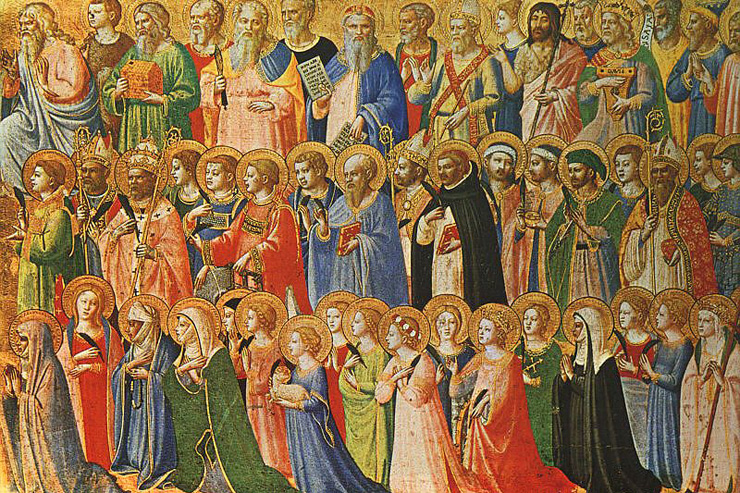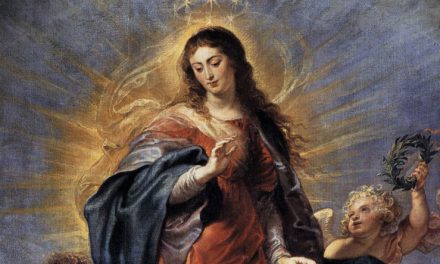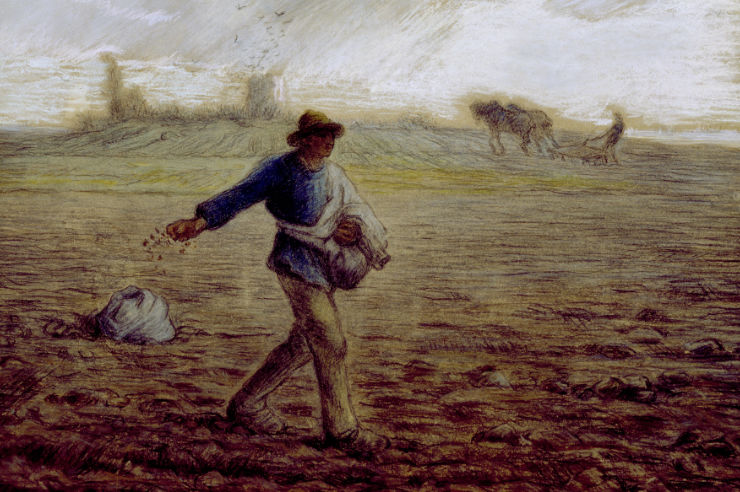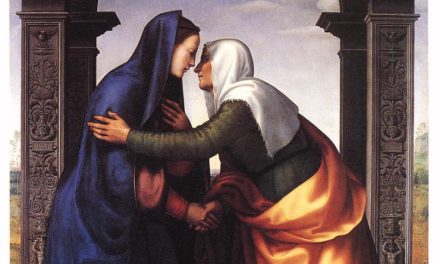I overheard a conversation after a morning bible study at my parish about praying to Mary and the Saints. It went something like this (names changed)…
“Thanks so much for inviting me, Beth. You have a wonderful group here. I have a question, though. I hope it doesn’t offend you, but being non-Catholic, I just don’t understand this praying to Mary. Do Catholics really do that?”
Beth smiled at Sarah and explained, “No, of course Catholics don’t pray TO Mary, we pray WITH Mary; asking her to intercede—or pray—for us.”
~ ~ ~ ~ ~
You have probably heard this answer before. It sounds right. Indeed, many of you might have given this answer before. But is it the right answer? No, not precisely.
Catholics do Pray to Mary and the Saints
Yes, Catholics do ask Mary and the other saints to pray for us; to be intercessors for us. We ask the saints by their powerful intercession to obtain for us God’s favors and graces. Together with them, we appeal to God. We similarly ask the angels for aid and protection, be it an archangel or our own guardian angel. But what is all this speaking to Mary and the saints if not prayer? Anyone asking the question can see this and will be put off by the above, imprecise answer. So the correct answer is, “Yes, of course Catholics pray to Mary and the other saints, you should too! Would you like to learn why we do this and why it is permitted by God?”
The purpose of this article is to help you understand why we are able to pray to the saints::
- Why do Catholics pray to Mary and the saints in heaven? Do we think they are gods? Does this mean that we worship them?
- Aren’t Mary and the Saints dead and doesn’t the bible teach us not to attempt to communicate with the dead?
- Isn’t Jesus the one mediator between God and man?
- Doesn’t Catholic prayer to the saints take away from Christ, especially as the one mediator between God and man?
Mary and the Saints are God’s Creatures – They are not Divine
The first thing that has be set straight is that Catholics do not worship Mary or the other saints in heaven. We love Mary as our mother. We love the saints as our elder brothers and sisters in the faith. When we love someone, we want to talk to them and when we speak to Mary or the saints, that is one aspect of prayer. That we speak to them does not imply that we worship them as if they were gods. Such prayer is simply a sign that we love them as creatures. We show them honor. Mary and the saints could not hear our prayers unless God allowed it. That God has allowed it can be seen very easily by the conversation that Mary had with the Archangel Gabriel as recorded in Luke’s Gospel. No one concludes from this that Mary worshiped Gabriel. Nor should anyone conclude that our speaking to Mary and the saints implies that we worship them or hold them up as equals to God.
To better grasp this, we need to explore this further as we seek answers from the Church to the above questions.
The Communion of Saints Defined
To begin to understand, it is necessary to study what is meant when we refer to the Communion of Saints. The “Communion of Saints, is at its most essential meaning, the sharing of (or communicating of) the grace of Jesus Christ with and among His family members, the Church. Let’s look at some references to this from both the bible and the catechism.
CCC 948 – The term “communion of saints” therefore has two closely linked meanings: “communion in holy things (sancta)” and “among holy persons (sancti).”
Sancta sanctis! (“God’s holy gifts for God’s holy people”) is proclaimed by the celebrant in most Eastern liturgies during the elevation of the holy Gifts before the distribution of communion. The faithful (sancti) are fed by Christ’s holy body and blood (sancta) to grow in the communion of the Holy Spirit (koinonia) and to communicate it to the world.
This communion of saints is, therefore, the Church. St. Paul refers to this “Mystical Body of Christ” in Colossians 1:24 where he equates Christ’s “body” with His “church”.
Colossians 1:24-26 (RSV-CE) – Now I rejoice in my sufferings for your sake, and in my flesh I complete what is lacking in Christ’s afflictions for the sake of his body, that is, the church, of which I became a minister according to the divine office which was given to me for you, to make the word of God fully known, the mystery hidden for ages and generations but now made manifest to his saints.
St. Paul has some very interesting things to say about this Mystical Body of Christ in the twelfth chapter of 1 Corinthians that will further help us.
- The body is one, even though it is made up of many members.
- The weaker members of the body are indispensible.
- Those members that appear to be less honorable are given the greatest honor.
- There can be no discord in the body, all members must care for one another.
- If one member suffers, all the members suffer; and, if one member is honored, all rejoice together.
- We have been baptized into one body and we are all individually members of that body.
1 Corinthians 12:12-27 (RSV-CE) – For just as the body is one and has many members, and all the members of the body, though many, are one body, so it is with Christ. For by one Spirit we were all baptized into one body – Jews or Greeks, slaves or free – and all were made to drink of one Spirit.
For the body does not consist of one member but of many. If the foot should say, “Because I am not a hand, I do not belong to the body,” that would not make it any less a part of the body. And if the ear should say, “Because I am not an eye, I do not belong to the body,” that would not make it any less a part of the body. If the whole body were an eye, where would be the hearing? If the whole body were an ear, where would be the sense of smell? But as it is, God arranged the organs in the body, each one of them, as he chose. If all were a single organ, where would the body be? As it is, there are many parts, yet one body. The eye cannot say to the hand, “I have no need of you,” nor again the head to the feet, “I have no need of you.” On the contrary, the parts of the body which seem to be weaker are indispensable, and those parts of the body which we think less honorable we invest with the greater honor, and our unpresentable parts are treated with greater modesty, which our more presentable parts do not require. But God has so composed the body, giving the greater honor to the inferior part, that there may be no discord in the body, but that the members may have the same care for one another. If one member suffers, all suffer together; if one member is honored, all rejoice together.
Now you are the body of Christ and individually members of it.
In Colossians, St. Paul refers to Christ as the “head of the body, the church.” Just as the human body is so ordered as to be able to provide for its nourishment, so too does Christ provide for us. We who are baptized into this one body, whose head is Christ, resemble Christ, for He communicates His divine life and grace to us through the sacraments He instituted and so provides for our nourishment.
Colossians 1:18 (RSV-CE) – He is the head of the body, the church; he is the beginning, the first-born from the dead, that in everything he might be pre-eminent.
CCC 947 – “Since all the faithful form one body, the good of each is communicated to the others. . . . We must therefore believe that there exists a communion of goods in the Church. But the most important member is Christ, since he is the head. . . . Therefore, the riches of Christ are communicated to all the members, through the sacraments.” “As this Church is governed by one and the same Spirit, all the goods she has received necessarily become a common fund.”
“But what about those who have died? Okay, I might agree with this as it relates to believing, baptized Christians who have not died. But what about those who have died?”
Well, Jesus died… and He rose from the dead. And He has promised that we too who die in His grace, have life beyond the grave. Indeed, those who have died are closer to Christ than are we who remain alive on this earth. We must remember that when we die, we continue to exist as living human beings, our souls and bodies temporarily separated, to be reunited on the last day at the resurrection of the body. And if we die in a state of grace, we enter heaven, either immediately or after being purged of any remaining imperfections and temporal punishments due to sin. We do not cease to be members of the Mystical Body of Christ at our deaths.
The Church has traditionally taught that the Body of Christ is comprised of three categories of the Communion of Saints:
- The Church Militant – saints who are alive on earth.
- The Church Suffering – saints who are alive and being perfected in purgatory.
- The Church Triumphant – saints who are alive “in heaven” participating in the Beatific Vision… seeing God as He is, face to Face.
Those who have departed this life are alive. Mary and all the saints in heaven are alive and are members of His one body… they continue to share in all ways as St. Paul taught, except their suffering is over and they see God more clearly than do we on earth who see only partially. And in particular, they remain intercessors on behalf of the Church not yet in Glory, doing as St. Paul urged all of us to do, to make supplications, prayers, intercessions, and thanksgivings for all men and women, that they may live a godly and peaceable life. [cf. 1 Timothy 2:1-2 (RSV-CE)]
The bible teaches that we are to ask (pray to) those in heaven to both pray with us and for us.
Psalm 103:20-22 (RSV-CE)
Bless the LORD, O you his angels,
you mighty ones who do his word,
hearkening to the voice of his word!Bless the LORD, all his hosts,
his ministers that do his will!Bless the LORD, all his works,
in all places of his dominion.
Bless the LORD, O my soul!Psalm 148:1-2 (RSV-CE)
Praise the LORD! Praise the LORD from the heavens,
praise him in the heights!Praise him, all his angels,
praise him, all his host!
Those in heaven, assist the Lamb as He intercedes for us, bringing before the Throne of God our prayers.
Revelation 5:6-8 (RSV-CE) – And between the throne and the four living creatures and among the elders, I saw a Lamb standing, as though it had been slain, with seven horns and with seven eyes, which are the seven spirits of God sent out into all the earth; and he went and took the scroll from the right hand of him who was seated on the throne. And when he had taken the scroll, the four living creatures and the twenty-four elders fell down before the Lamb, each holding a harp, and with golden bowls full of incense, which are the prayers of the saints;
And the angels, too, carry our prayers to God’s Throne…
Revelation 8:3-4 (RSV-CE) – And another angel came and stood at the altar with a golden censer; and he was given much incense to mingle with the prayers of all the saints upon the golden altar before the throne; and the smoke of the incense rose with the prayers of the saints from the hand of the angel before God.
“But isn’t Christ the one Mediator? Doesn’t this idea of having others intercede or pray for us take away from Christ as the one mediator between God and man? Why should I bother with asking others to pray for me, why don’t I just go directly to God?”
Of course Jesus Christ is the one mediator, but asking others for their help does not take anything away from Christ. Remember that St. Paul urged us to pray for one another (cf. 1 Timothy 2:1-2). Don’t you ask people on earth to pray for you? Don’t you likewise pray for others? Asking a saint who is in heaven to pray for us does not take away from Christ’s mediation any more than asking someone you know on earth to pray for you. This is not an either/or, it is both/and. Surely you want others to pray for you, especially the righteous, whose prayers avail us much and are of great power in their effect! (cf. James 5:16)
“But isn’t attention to Mary and the saints a distraction? If I am giving attention to Mary, I am neglecting the Lord, right? I mean that if I am thinking about her, I am not thinking about Him and that can’t be good, right?”
Absolutely not. When you give honor and attention to Mary, you give honor to Jesus. Remember that she is also a member of the Body of Christ and St Paul says we care for one another. If Jesus is both your King and your friend… and your brother, how do you think He feels when His subjects, His friends, His brothers and sisters neglect and ignore His mother… the very same mother He gave to us all from the Cross (cf. John 19:26-27 and CCC 967-970).
John 19:26-27 (RSV-CE) – When Jesus saw his mother, and the disciple whom he loved standing near, he said to his mother, “Woman, behold, your son!” Then he said to the disciple, “Behold, your mother!”
CCC 970 – “Mary’s function as mother of men in no way obscures or diminishes this unique mediation of Christ, but rather shows its power. But the Blessed Virgin’s salutary influence on men . . . flows forth from the superabundance of the merits of Christ, rests on his mediation, depends entirely on it, and draws all its power from it.” “No creature could ever be counted along with the Incarnate Word and Redeemer; but just as the priesthood of Christ is shared in various ways both by his ministers and the faithful, and as the one goodness of God is radiated in different ways among his creatures, so also the unique mediation of the Redeemer does not exclude but rather gives rise to a manifold cooperation which is but a sharing in this one source.”
Likewise, neither is our attention to the saints whether on earth, in purgatory or in heaven a distraction. After all, we are a family, the Family of God, and we care for one another. The Lord has asked us to care for one another. The saints in heaven are alive. They care for us. They listen to us. They intercede for us. We are a family. That is what a family does… that is what love does.
Into the deep…
Into the Deep by Deacon Mike Bickerstaff is a regular feature of the The Integrated Catholic Life™.
You can follow Deacon Mike on Twitter right here:















